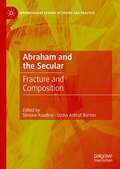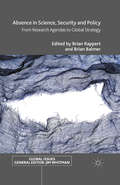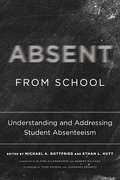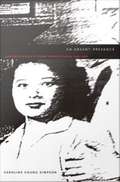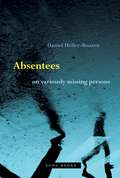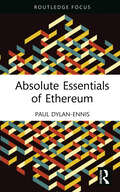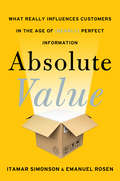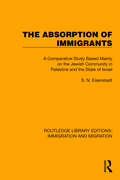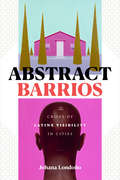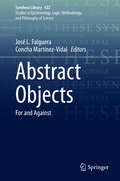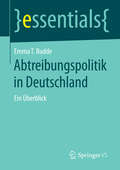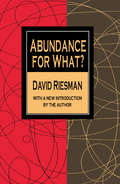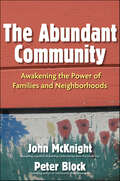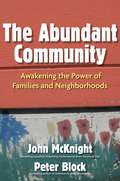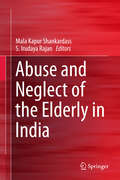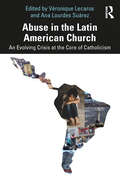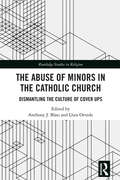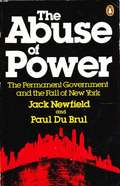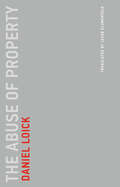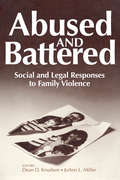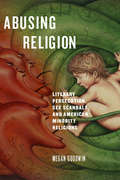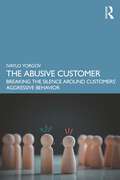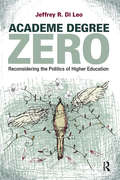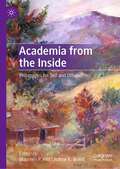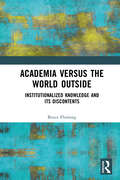- Table View
- List View
Abraham and the Secular: Fracture and Composition (Interreligious Studies in Theory and Practice)
by Simone Raudino Uzma Ashraf BartonThis volume offers both theoretical approaches and case studies on the relationship between religion and the secular world. Bringing together contributions from seasoned authors, religious leaders, and brilliant new scholars, it frames the long-standing debate on how to structure a comparative representation of any religion on the one side, and the secular world on the other. Often, the very act of comparing religions exposes them to an assessment of their role in history and politics, and risks leading to some sort of grading and ranking, which is highly unproductive. By candidly discussing the relation between religion and the secular and providing concrete examples from four case studies (Christianity, Islam, Judaism, Baha’I’), this book provides an important reference on how this can be achieved in a neutral way, while keeping in mind the normative finality of seeking conciliation to existing fractures, both within and among religions.
Absence in Science, Security and Policy: From Research Agendas to Global Strategy (Global Issues)
by Brian Balmer Brian RappertThis book explores the absent and missing in debates about science and security. Through varied case studies, including biological and chemical weapons control, science journalism, nanotechnology research and neuroethics, the contributors explore how matters become absent, ignored or forgotten and the implications for ethics, policy and society.The chapter 'Sensing Absence: How to See What Isn't There in the Study of Science and Security' is open access under a CC BY 4.0 license via link.springer.com.
Absent from School: Understanding and Addressing Student Absenteeism
by Todd Rogers Johannes DemarziIn Absent from School, Gottfried and Hutt offer a comprehensive and timely resource for educators and policy makers seeking to understand the scope, impact, and causes of chronic student absenteeism. The editors present a series of studies by leading researchers from a variety of disciplines that address which students are missing school and why, what roles schools themselves play in contributing to or offsetting patterns of absenteeism, and ways to assess student attendance for purposes of school accountability. The contributors examine school-based initiatives that focus on a range of issues, including transportation, student health, discipline policies, and protections for immigrant students, as well as interventions intended to improve student attendance. Only in the past two or three years has chronic absenteeism become the focus of attention among policy makers, civil rights advocates, and educators. Absent from School provides the first critical, systematic look at research that can inform and guide those who are working to ensure that every child is in school and learning every day.
An Absent Presence: Japanese Americans in Postwar American Culture, 1945-1960
by Caroline Chung SimpsonThere have been many studies on the forced relocation and internment of nearly 120,000 Japanese Americans during World War II. But An Absent Presence is the first to focus on how popular representations of this unparalleled episode in U. S. history affected the formation of Cold War culture. Caroline Chung Simpson shows how the portrayal of this economic and social disenfranchisement haunted--and even shaped--the expression of American race relations and national identity throughout the middle of the twentieth century. Simpson argues that when popular journals or social theorists engaged the topic of Japanese American history or identity in the Cold War era they did so in a manner that tended to efface or diminish the complexity of their political and historical experience. As a result, the shadowy figuration of Japanese American identity often took on the semblance of an "absent presence. " Individual chapters feature such topics as the case of the alleged Tokyo Rose, the Hiroshima Maidens Project, and Japanese war brides. Drawing on issues of race, gender, and nation, Simpson connects the internment episode to broader themes of postwar American culture, including the atomic bomb, McCarthyism, the crises of racial integration, and the anxiety over middle-class gender roles. By recapturing and reexamining these vital flashpoints in the projection of Japanese American identity, Simpson fills a critical and historical void in a number of fields including Asian American studies, American studies, and Cold War history.
Absentees: On Variously Missing Persons
by Daniel Heller-RoazenAn intellectually adventurous account of the role of nonpersons that explores their depiction in literature and challenges how they are defined in philosophy, law, and anthropology In thirteen interlocking chapters, Absentees explores the role of the missing in human communities, asking an urgent question: How does a person become a nonperson, whether by disappearance, disenfranchisement, or civil, social, or biological death? Only somebody can become a “nobody,” but, as Daniel Heller-Roazen shows, the ways of being a nonperson are as diverse and complex as they are mysterious and unpredictable. Heller-Roazen treats the variously missing persons of the subtitle in three parts: Vanishings, Lessenings, and Survivals. In each section and with multiple transhistorical and transcultural examples, he challenges the categories that define nonpersons in philosophy, ethics, law, and anthropology. Exclusion, infamy, and stigma; mortuary beliefs and customs; children’s games and state censuses; ghosts and “dead souls” illustrate the lives of those lacking or denied full personhood. In the archives of fiction, Heller-Roazen uncovers figurations of the missing—from Helen of Argos in Troy or Egypt to Hawthorne’s Wakefield, Swift’s Captain Gulliver, Kafka’s undead hunter Gracchus, and Chamisso’s long-lived shadowless Peter Schlemihl. Readers of The Enemy of All and No One’s Ways will find a continuation of those books’ intense intellectual adventures, with unexpected questions and arguments arising every step of the way. In a unique voice, Heller-Roazen’s thought and writing capture the intricacies of the all-too-human absent and absented.
Absolute Essentials of Ethereum (Absolute Essentials of Business and Economics)
by Paul Dylan-EnnisAbsolute Essentials of Ethereum is a concise textbook which guides the reader through the fascinating world of the emerging Ethereum ecosystem, from the basics of how its blockchain works to cutting-edge applications.Written by an experienced educator, each chapter is designed to progress potential students from class to class. Technical concepts are clearly explained for those new to the topic and readers are supported with definitions and summaries in each chapter. Real-life case studies situate the overviews in a contemporary context. Topics covered include the Ethereum Execution and Consensus layers, Ethereum governance and community, Decentralised Autonomous Organisations (DAOs), Decentralised Finance (DeFi), Non-Fungible Tokens (NFTs) and Layer 2.This book is the ideal text to support undergraduate and postgraduate courses on blockchain technologies, cryptocurrencies, Web3 and fintech, as well as for those who want to know how Ethereum really works.
Absolute Value: What Really Influences Customers in the Age of (Nearly) Perfect Information
by Emanuel Rosen Itamar SimonsonGoing against conventional wisdom, Absolute Value reveals what really influences customers today and offers a new framework--the Influence Mix--for thinking about consumer decision making, which should help managers develop more effective marketing strategies.How people buy things has changed profoundly--yet the fundamental thinking about consumer decision making and marketing has not. Most marketers still believe that they can shape consumers' perceptions and drive their behaviors. In this provocative book, Stanford professor Itamar Simonson and best-selling author Emanuel Rosen show why current mantras about branding and loyalty are losing their relevance. When consumers base their decisions on reviews from other users, easily accessed expert opinions, price comparison apps, and other emerging technologies, everything changes. Contrary to what we frequently hear, consumers will (on average) make better choices and act more rationally.Absolute Value answers the pressing question of what influences customers in this new age. Simonson and Rosen identify the old-school marketing concepts that need to change and explain how a company should design its communication strategy, market research program, and segmentation strategy in the new environment. Filled with deep analysis, case studies, and cutting-edge research, this forward-looking book provides an entirely new way of thinking about marketing.
The Absorption of Immigrants: A Comparative Study Based Mainly on the Jewish Community in Palestine and the State of Israel (Routledge Library Editions: Immigration and Migration #2)
by S.N. EisenstadtThe Absorption of Immigrants (1954) examines the assimilation of immigrants in the Yishuv (the Jewish Community in Palestine) and in the State of Israel. It provides a historical analysis of the social structure of the Yishuv and of the development of the new Israeli society. The book also applies the general framework to the analysis of some main types of modern migrations and a series of tentative conclusions is given which may serve as detailed hypotheses for subsequent inquiries. In this way a comparative study of different types of migrations and absorption of immigrants is built up, and an objective evaluation can be made of the place of an Israeli Society among other communities, and their special ways of absorbing new immigrants.
Abstract Barrios: The Crises of Latinx Visibility in Cities
by Johana LondoñoIn Abstract Barrios Johana Londoño examines how Latinized urban landscapes are made palatable for white Americans. Such Latinized urban landscapes, she observes, especially appear when whites feel threatened by concentrations of Latinx populations, commonly known as barrios. Drawing on archival research, interviews, and visual analysis of barrio built environments, Londoño shows how over the past seventy years urban planners, architects, designers, policy makers, business owners, and other brokers took abstracted elements from barrio design—such as spatial layouts or bright colors—to safely “Latinize” cities and manage a long-standing urban crisis of Latinx belonging. The built environments that resulted ranged from idealized notions of authentic Puerto Rican culture in the interior design of New York City’s public housing in the 1950s, which sought to diminish concerns over Puerto Rican settlement, to the Fiesta Marketplace in downtown Santa Ana, California, built to counteract white flight in the 1980s. Ultimately, Londoño demonstrates that abstracted barrio culture and aesthetics sustain the economic and cultural viability of normalized, white, and middle-class urban spaces.
Abstract Objects: For and Against (Synthese Library #422)
by José L. Falguera Concha Martínez-VidalThis volume examines the question “Do abstract objects exist?”, presenting new work from contributing authors across different branches of philosophy. The introduction overviews philosophical debate which considers: what objects qualify as abstract, what do we mean by the word "exist” and indeed, what evidence should count in favor or against the thesis that abstract objects exist. Through subsequent chapters readers will discover the ubiquity of abstract objects as each philosophical field is considered.Given the ubiquitous use of expressions that purportedly refer to abstract objects, we think that it is relevant to attend to the controversy between those who want to advocate the existence of abstract objects and those who stand against them. Contributions to this volume depict positions and debates that directly or indirectly involve taking one position or other about abstract objects of different kinds and categories. The volume provides a variety of samples of how positions for or against abstract objects can be used in different areas of philosophy in relation to different matters.
Abtreibungspolitik in Deutschland: Ein Überblick (essentials)
by Emma T. BuddeEmma T. Budde legt den Fokus auf die Darstellung und Erklärung der Regulierungsgeschichte von Abtreibungen in Deutschland von 1960 bis 2015. Sie kontrastiert die deutsche Entwicklung mit der Gesetzesentwicklung in Westeuropa. Hinsichtlich der Reformgeschwindigkeit und des Regulierungsniveaus ist Deutschland im internationalen Mittelfeld angesiedelt. Eine Besonderheit deutscher Abtreibungspolitik ist die Widersprüchlichkeit des aktuell geltenden Gesetzes, welches den Schwangerschaftsabbruch als gesetzeswidrig, aber gleichzeitig straffrei einstuft.
Abundance for What?
by David RiesmanThis classic collection of essays by David Riesman discusses the implications of affluence in America. Riesman maintains that the question that should be raised by wealth has shifted over time from how to obtain wealth to how to make use of it. Another key theme concerns issues relevant to higher education, such as academic freedom. Abundance for What? examines the notion that America is not as open a society as it may appear to be; it then shows how social science may be used to explain why this is so. And now in a brilliant, lengthy reevaluation Riesman both clarifies and revises that earlier assessment with unusual luster and candor., The volume begins with a group of essays that describe the impact of the Cold War. After warning against depending on a war economy, Riesman shifts the focus of discussion to a central characteristic of the Cold War epoch: the uses and abuses of abundance in expanding leisure time. Several essays deal with suburbs as the locale of abundance, while others study the place of the automobile in American life. Riesman describes the impact of American abundance on other nations. Among the many other subjects discussed in Abundance for What? are the education of women, generational shifts in attitudes, and a study of the national character., In his major new 100-page introduction, Riesman also relates the experiences that originally inspired him to write these essays. He then talks about the social and historical changes that have occurred since their publication. His synthesis of old Ideas with contemporary ones makes this a compelling volume. Abundance for What? continues to hold a significant place in the social and cultural critiques of contemporary America and will be of interest to historians, psychologists, educators, and urban policymakers alike.
Abundant Community: Awakening the Power of Families and Neighborhoods
by John McKnightWe need our neighbors and community to stay healthy, produce jobs, raise our children, and care for those on the margin. Institutions and professional services have reached their limit of their ability to help us. The consumer society tells us that we are insufficient and that we must purchase what we need from specialists and systems outside the community. We have become consumers and clients, not citizens and neighbors. John McKnight and Peter Block show that we have the capacity to find real and sustainable satisfaction right in our neighborhood and community. This book reports on voluntary, self-organizing structures that focus on gifts and value hospitality, the welcoming of strangers. It shows how to reweave our social fabric, especially in our neighborhoods. In this way we collectively have enough to create a future that works for all.
The Abundant Community: Awakening the Power of Families and Neighborhoods
by John Mcknight Peter BlockThere is a growing movement of people with a different vision for their local communities. They know that real satisfaction and the good life are not provided by organizations, institutions, or systems. No numbers of great CEOs, central offices, or long range plans produce what a community can produce. People are discovering a new possibility for their lives. They have a calling. They are called. And together they call upon themselves. This possibility is idealistic, and yet it is an ideal within our grasp. It is a possibility that is both idealistic and realistic. Our culture leads us to believe that a satisfying life can be purchased. It tells us that in the place where we live, we don't have the resources to create a good life. This book reminds us that a neighborhood that can raise a child, provide security, sustain our health, secure our income, and care for our vulnerable people is within the power of our community. This book gives voice to our ideal of a beloved community. It reminds us of our power to create a hope-filled life. It assures us that when we join together with our neighbors we are the architects of the future where we want to live.
Abuse and Neglect of the Elderly in India
by S. Irudaya Rajan Mala Kapur ShankardassThis book highlights different aspects of the problem of elder abuse and neglect in India, and discusses its forms as well as means of prevention, intervention and management. It presents a framework for understanding the occurrence of elder abuse and neglect in India, placing the discussion within the global context. Elder abuse and neglect is a growing concern in South Asia, and this is the first comprehensive account of the topic from India. It uses data from different parts of India to describe the various dimensions of elder abuse and neglect among different population categories and sections in society. Covering rural and urban areas in different states, it discusses current perspectives on elder abuse and neglect at the household level, widows, HIV-affected populations, and those residing in institutions. This book comprises views from experts in the field and is of interest to researchers and academics from the social and behavioural sciences, policy makers, and NGOs.
Abuse in the Latin American Church: An Evolving Crisis at the Core of Catholicism
by Véronique Lecaros Ana Lourdes SuárezThis book addresses the crisis of sexual abuse in the Roman Catholic Church in Latin America, the region of the world with the highest percentage of Catholics. Bringing together research from across the continent, it demonstrates that abuse within the Church is indeed a global phenomenon, though abuses have taken different forms according to varying sociocultural contexts. With attention to abuses committed against children, women and vulnerable adults – by both men and women – within the settings of parishes, new religious movements and international religious organizations, it also raises questions of justice, asking how to assess the suffering of victims, how to deal with abusers and how to prevent abuses. It will therefore be of interest to scholars of religious studies, sociology, Latin American studies, criminology, theology, and religious leaders with interests in the abuses and scandals that have been revealed in the worldwide Church.
The Abuse of Minors in the Catholic Church: Dismantling the Culture of Cover Ups (Routledge Studies in Religion)
by Anthony J. Blasi Lluis OviedoThis book offers an academically rigorous examination of the biological, psychological, social and ecclesiastical processes that allowed sexual abuse in the Catholic Church to happen and then be covered up. The collected essays provide a means to better assess systemic wrongdoing in religious institutions, so that they can be more effectively held to account. An international team of contributors apply a necessarily multi-disciplinary approach to this difficult subject. Chapters look closely at the sexual abuse of minors by Roman Catholic clerics, explaining the complexity of this issue, which cannot be reduced to simple misconduct, sexual deviation, or a management failure alone. The book will help the reader to better understand the social, organizational, and cultural processes in the Church over recent decades, as well as the intricate world of beliefs, moral rules, and behaviours. It concludes with some strategies for change at the individual and corporate levels that will better ensure safeguarding within the Catholic Church and its affiliate institutions. This multifaceted study gives a nuanced analysis of this huge organizational failure and offers recommendations for effective ways of preventing it in the future. As such, it will be of keen interest to scholars of Religious Studies, Sociology of Religion, Psychology, Psychiatry, Legal Studies, Ethics, Anthropology, Cultural Studies, History, and Theology.
The Abuse of Power
by Jack Newfield Paul A. DuBrul“This book was written as an act of gratitude and loyalty to New York City by two native sons. The only bias we admit to is a love for this city, and particularly for its neighborhoods. We were born here. We grew up in working-class families in neighborhoods called Bedford Stuyvesant and Elmhurst. The only reason we both have college educations is that the City University was free in 1956. We come from a tradition that believes in paying your debts. Our way of repaying New York City for our free college education is to try and tell the truth about what is happening now to our city. This book was born, four years ago, in our mutual recognition that something was profoundly wrong with New York and that the condition was worsening, despite decades of talk about "reform." The knowledge and the anger in these pages were nourished by day-to-day involvement with the city's small agonies. Welfare mothers with lead-poisoned children. Working-class Polish and Italian families losing their homes of a lifetime for someone else's profit. The unspeakable suffering, and the unspeakable corruption, in the nursing-home industry. A brave and difficult rent strike waged by 50,000 people in Co-op City. These are the people for whom we wrote this book, although many of them will perhaps never read it. We hope, though, that by describing the reality, by naming the names, and by proposing some remedies, we are offering a tool for others to use in liberating New York City in the future. This is the repayment of our debt.” – By Author.
The Abuse of Property (Untimely Meditations #19)
by Daniel LoickA fundamental critique of the current property regime, calling for radical social and political change.In The Abuse of Property, Daniel Loick offers a multifaceted philosophical critique of the concept of property, broadly understood. He argues that property should not be the dominant framework in which human beings regulate the use of things, that property is not the same as use. Property rights, in his view, are not conditions of freedom or justice, but deficient, dysfunctional, and harmful ways of interacting with other people and the natural environment. He dissects not only the classic justifications of property (from John Locke's justification of property as a natural right based on individual freedom to Hegel's justification of property as a form of mutual recognition) but also the classic critiques of property, from Proudhon and Marx up to Adorno and Agamben.Through an innovative critical approach to legal studies, Loick demonstrates how the concept of property, historically applied to things and people and still a linchpin of our distorted relation with the world, forms a direct line from the Occupy movement to Black Lives Matter and beyond.
Abused and Battered: Social and Legal Responses to Family Violence
by Dean D. Kundsen “ JoAnn L. MillerThat family violence injures and kills its victims both physically and psychologically was established over two decades ago by early researchers in this field. Abused and Battered heralds the second generation of domestic abuse research: it examines the implications of the legal and social responses to both victims and offenders by systematically addressing the intended and unintended consequences of programs and procedures designed to ameliorate the effects of spousal and child abuse. Contributors to this multidisciplinary volume represent the leading perspectives in public health, law and criminal justice, psychology, and sociology. They provide new and sophisticated insights regarding the etiology of the multiple forms of family abuse and they suggest innovative strategies for mitigating the anguish resulting from physical and emotional violence against adults and children within households. The results of this research will be of interest to students and practitioners in sociology, public health, psychology and family studies, and to clinicians and therapists who treat victims or offenders.
Abusing Religion: Literary Persecution, Sex Scandals, and American Minority Religions
by Megan GoodwinSex abuse happens in all communities, but American minority religions often face disproportionate allegations of sexual abuse. Why, in a country that consistently fails to acknowledge—much less address—the sexual abuse of women and children, do American religious outsiders so often face allegations of sexual misconduct? Why does the American public presume to know “what’s really going on” in minority religious communities? Why are sex abuse allegations such an effective way to discredit people on America’s religious margins? What makes Americans so willing, so eager to identify religion as the cause of sex abuse? Abusing Religion argues that sex abuse in minority religious communities is an American problem, not (merely) a religious one.
The Abusive Customer: Breaking the Silence Around Customers’ Aggressive Behavior
by Ivaylo YorgovBreaking the silence around an all-too-common problem, this book offers insights into the triggers of customer aggression against service employees, explores its consequences, and provides practical advice for handling abusive customers and mitigating the damage they inflict. Today, more than half of the world’s population is employed in the service sector. This fundamental economic shift is accompanied by heightened attention to customer service and the ‘customer is always right’ paradigm. But when customers act aggressively, everyone pays a price: frontline employees, their families, their companies, and even the abusive customers themselves. Unlike breezier titles on the subject, this book is based in academic research—exploring the ‘why?’ and ‘when?’ behind abusive behavior—that underpins its practical approach, illustrated with real-world stories from professionals on the front lines of customer service. The book’s useful tools include a sample anti-customer abuse policy and management process, a cheat sheet of practices that work for handling its consequences, a summary of effective service recovery processes and practices, and abuse-handling training list and curriculum templates. Managers and workers in customer-facing roles, in industries such as retail, hospitality, tourism, banking, and contact centers, will welcome this essential resource as part of their efforts to stop aggressive customer behavior, and improve employee morale, job satisfaction, and engagement.
Academe Degree Zero: Reconsidering the Politics of Higher Education (Cultural Politics And The Promise Of Democracy Ser.)
by Jeffrey R. Di LeoAcademe Degree Zero brings together ten essays that identify and critically examine the key issues facing professionals in higher education today. These include the nature and limits of anonymity in academic discourse, the ways in which affiliation and prestige temper academic judgement, and the role of collegiality in academic life. Through numerous essays, edited books and journal issues, Jeffrey R. Di Leo's cross-disciplinary work has consistently been at the edge of current thinking and critical efforts to lay bare the reality of contemporary academic life. Academe Degree Zero provides a snapshot of academic identity and relations in a time of major technological and economic transformation and in the context of growing corporatisation of higher education.
Academia from the Inside: Pedagogies for Self and Other
by Maureen P. Hall Aubrie K. BraultThis book invites readers to explore how fourteen different experts in their respective fields create deeper meaning in their profession and work with students through thinking, in multiple ways, about the self who teaches, the self who learns, and the ways in which these selves interact within the academy. Essays in this book explore the “inside” of academia through three themes: Pursuing Authenticity, Creating Creative Community, and Humanizing Education. Contributors reflect on their own lived experiences in the academy and on pedagogies that they have created for their students. Embodied education, the theoretical framework of this book, draws on ideas of educators Parker Palmer from the West and Dr. Chinmay Pandya from the East, emerging through contributors’ collaborative work. In embodied education, teachers and learners share experiences that lead to self-understanding and together find ways to humanize spaces in academia.
Academia versus the World Outside: Institutionalized Knowledge and Its Discontents
by Bruce FlemingAcademia versus the World Outside lays out the givens of the knowledge industry located within the ivory tower, colleges and universities. It then moves outside academia to consider this restricted world the way most people see it. The contrast between these two views of academia explains and is at the basis of the left–right animosity of our day.The knowledge industry, a creation of the post-Enlightenment modern age along with other industrial and post-industrial enterprises, is based on creating and adding to a store of knowledge as its own end. This makes academia alien to the more random and personal nature of knowledge acquisition in our everyday lives, as indeed every industry is alien to everyday life in the modern age. Yet most academics are so immersed in the peculiar project they have chosen as their life’s work that they are either unaware of or unsympathetic to the fact that people outside live very different lives with very different presuppositions. Most non-academics, for their part, find academia strange, and for very good reason. Academia versus the World Outside makes this contrast and conflict clear from both directions.This book is aimed primarily at academics, most of whom so take for granted the givens of what they do that they fail to understand why the vast majority of people outside find academia alien. This has led to an increasingly hostile and utterly predictable left–right political conflict, academia tending increasingly left and the world outside increasingly right. The goal of this book is to reduce the tension between both sides: if read by non-academics, this book may help these understand the givens of a world as strange to everyday life as any other specialized industry in the modern age.
